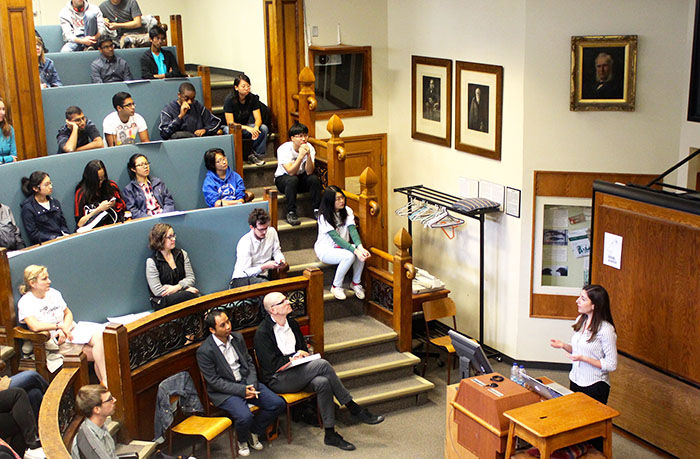From Jan. 15 to 19, the annual Soup and Science lecture series featured professors eager to present their research to students and spectators. The McGill Tribune reports:
Assistant Professor Thomas Preston
Department of Atmospheric and Oceanic Sciences
Emma Gillies
Contributor
On Jan. 16, Assistant Professor Thomas Preston from the Department of Atmospheric and Oceanic Sciences presented his research on atmospheric aerosols. These tiny suspended particles play an important role in maintaining a comfortable climate on Earth by scattering sunlight and creating a cooling effect.
“An aerosol […] is just a dispersion of liquid or solid particles inside a gas,” Preston explained. “These are typically around micrometre-size [or nanometre-size] dimensions.”
Preston’s lab is interested in developing techniques that accurately measure fundamental aerosol processes. He and his associates want to learn more about how aerosols interact with water and which types of particles readily condense to form cloud droplets.
The particles Preston studies are extraordinarily small. To account for their size, his lab uses ‘optical tweezers,’ instruments that use a highly focused laser beam to trap non-absorbing particles.
Once a particle has been successfully trapped, light-scattering tools allow the researchers to observe changes on a smaller scale. One of the main tools that Preston’s lab uses is a Whispering Gallery Mode (WGM), a standing electromagnetic wave confined within a smooth-edged resonator. These smooth edges cause waves to be reflected in a process called total internal reflection, resulting in very precise measurements.
“What’s really great about these [WGMs] is that they’re very sensitive to tiny changes in particle size and composition,” Preston said.
WGMs are used for studying droplet growth or shrinkage—as seen during evaporation and condensation—and chemical changes. The characteristics of aerosol particles are important when looking at climate forcings, external factors influencing Earth’s climate.
“In climate forcing, the largest uncertainty is the aerosol particle,” Preston said. “How it scatters light, [how] it cools the atmosphere or warms the atmosphere, there’s a huge uncertainty in that. So with our system, we can actually trap single particles and measure optical cross-sections of single individual particles with very low uncertainty.”
Assistant Professor Nii Addy
Desautels Faculty of Management
Claudia Leung
Contributor
On Jan. 17, Assistant Professor Nii Addy from the Desautels Faculty of Management presented his research on convergent innovation—the roles of government, businesses, and civil society in solving complex societal problems. Addy looks at ways of implementing sustainable change through multi-stakeholder partnerships across various sectors.
In an interview with The McGill Tribune, Addy elaborated on his model of convergent innovation with a provincial example.
“Quebec has the lowest obesity rates for kids,” Addy said. “There are policies in Quebec that ban fast food [advertisements] for children—but at the same time, kids in Quebec live very sedentary lifestyles. To understand the factors behind this, we need to review policy interventions to see what makes Quebec so different, but what’s missing from this is the ability to engage the business sector in coming up with obesity solutions. There are ways of making money without causing problems, and we have to come up with solutions that are more sustainable.”
Addy explained that keeping businesses engaged in the long term isn’t easy.
“[Businesses] like quick results. While civil society realises that some problems take longer […], what results can you provide to business leaders for ongoing commitment? How can you make them realise that there are profits in the long run? We [have] to influence stakeholder commitment and mindsets.”
Addy’s research has benefited from collaboration with colleagues in other fields, and he emphasized the importance of interdisciplinary collaboration.
“Every field has its own set of paradigms,” Addy said. “Cross-sector research is never boring because it leads to innovation, [allowing you to] see different opportunities.”
Addy offered similar advice to students seeking research opportunities.
“Learn about [professors] in other fields,” Addy said. “When you’re a Management student trying to get research in Management, everyone’s competing with the same skills. But you stand out when you talk to a [professor] from another field.”
Associate Professor Outi Mantere
Department of Psychiatry
Claudia Leung
Contributor
On Jan. 16, Associate Professor Outi Mantere from the Department of Psychiatry discussed her research on the relationship between disrupted circadian rhythms and severe mental illness. Circadian rhythms determine the sleeping and feeding patterns of organisms. Mantere’s research shows that these patterns are severely disrupted in individuals suffering from bipolar disorder or eating disorders.
From a sample of participants over the age of 40—all of whom were suffering from severe mental illnesses—Mantere found that they had a later onset of sleep at around 2 a.m.
“[Their sleep pattern shows they] are not corresponding to daylight, which causes problems with health,” Mantere told the Tribune. “These patients have a decreased quality of sleep; the duration of their sleep is short, fragmented, and restless, [which is also reflected] in unhealthy eating.”
Mantere’s research—a combination of human and animal data—also shows that a disrupted circadian rhythm is positively correlated with eating disorders. In her research with humans, Mantere uses an activity monitor to detect patterns in resting activity, generating data that is then complemented by surveys and interviews. In animals, a camera is placed directly into the brain to record how the rhythms are controlled at the molecular level.
“From animal data, we can see that there is a specific brain area controlling the circadian rhythm and another rhythm, where the latter controls eating rhythms in animals,” Mantere said. “The regulation of these two rhythms cause problems food disorders, and the mood of bipolar patients.”
For students interested in pursuing psychiatry, Mantere stressed that being able to handle trauma is an important skill to have within the field.
“Many students struggle in handling the pain and trauma they see their patients go through,” Mantere said. “It is rewarding to see them recover through the use of medication, [but in order to take on a research opportunity in this field,] you will have to become desensitised to these reactions.”
Professor Wayne Pollard
Department of Geography
Jade Prévost-Manuel
Science and Technology Editor
Cold and desolate but buzzing with scientific activity, the Arctic is a living paradox; both one of the harshest environments on the planet, and one of the most vulnerable. On Jan. 19, Professor Wayne Pollard of the Department of Geography spoke to Soup and Science attendees about his long-term research on ground ice in the Canadian High Arctic. Pollard has always been fascinated by the North.
“My first field [job] above the tree line convinced me that I wanted [to] work in the Arctic,” Pollard told The McGill Tribune. “Then, during my PhD, I had my first opportunity to work in the High Arctic, a true polar desert. [At that] point I was determined to work in the coldest and driest places on Earth.”
These days, Pollard studies water and ice in polar deserts to understand the processes shaping these environments and how they are capable of harbouring microbial life. He works to understand these extreme conditions by examining the permafrost.
“My research focuses on the different properties of ice [and its response] to changing climates,” Pollard said. “[In] our recent work in Antarctica, in places that rarely if ever experience air temperatures above [0 degrees celsius] (freezing), we have been looking at hyperarid conditions and how ice both forms and disappears by vapor deposition and sublimation.”
Now fueling interplanetary research, Pollard’s work is being used by NASA to understand potential ice conditions on Mars as part of the follow-the-water mantra, the motto driving scientists in the search for alien life.
Pollard’s enthusiasm as an academic is paralleled by his passion as an educator, and as Academic Director of the McGill Arctic Field Studies Semester—a 15-credit program in the Canadian high arctic—Pollard attested to the trip’s value.
“There’s a fully-equipped lab, there [are] dormitories—it’s 5 star accommodation,” Pollard said. “We interact with a broad spectrum of arctic activities, and the whole time the students involved are undertaking coursework as well as developing their own research.”






